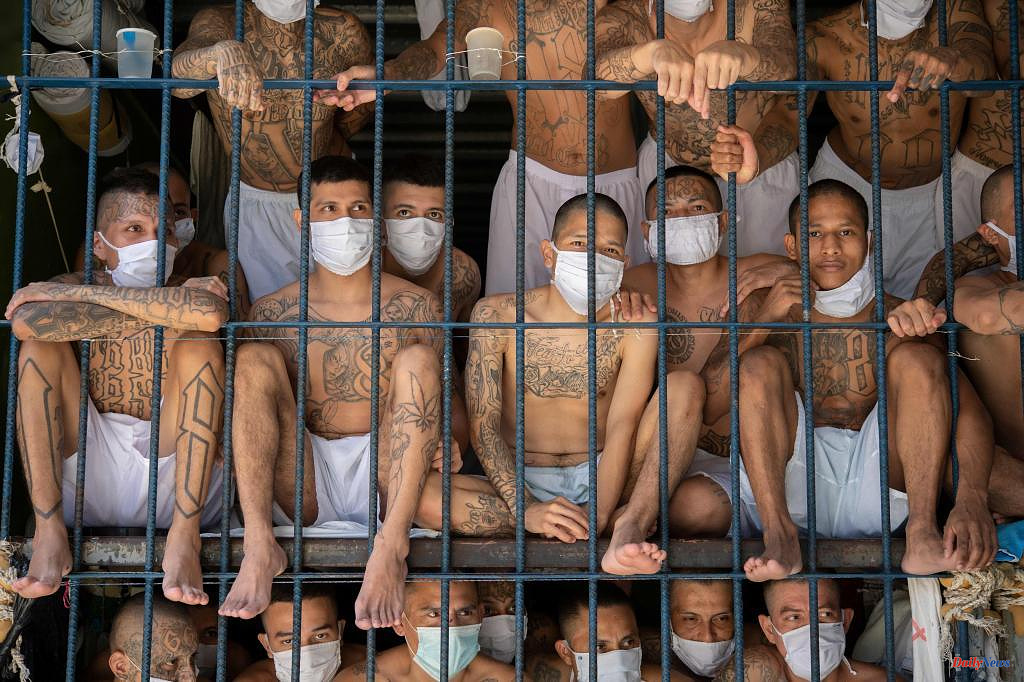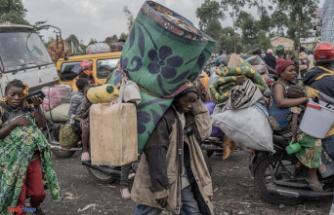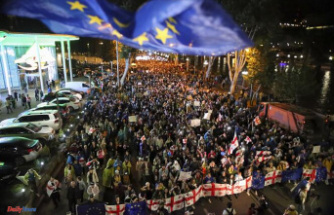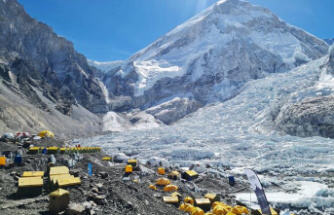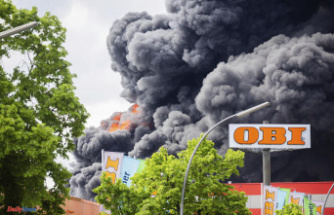The soldiers break into the house and take a 50-year-old woman: "It's for a normal inspection, she's coming back." She never came back. She died in a prison in El Salvador after being detained under the emergency regime approved on March 27, 2022, which limits the rights of the population with the excuse of the war against gangs promoted by President Nayib Bukele. The arrested woman had liver disease, so her family brought her medicines to the jail, although they were never received. When her relatives asked about her, her guardians responded that "if she needs medication, the doctor will notify her." They only called them to announce her death from severe pneumonia without even having been tried.
This is one of the 153 deaths in prisons in El Salvador between March 2022 and April this year, which have been documented by the human rights organization Cristosal in a devastating report in which it denounces that incarcerated people suffer systematic torture, electric shocks and arbitrary arrests. According to the investigation, at least 28 people died violently from torture, beatings, mechanical suffocation from strangulation and injuries, among other causes, which were documented by the same Institute of Legal Medicine (IML). In addition, in other cases, Cristosal has verified photographs of the corpses that show signs of violence, while remarking that "none of the deceased had been found guilty of the crime that was attributed to them at the time of their arrest."
Specifically, it details that the bodies had lacerations, bruises that show beatings, injuries with sharp or blunt objects, strangulation and hanging, among others. He indicates that several of the corpses "present evidence that the person was the victim of beatings and probably torture," with mechanical asphyxia being one of the most frequent causes of death described in the IML reports. Thus, Cristosal recalls that mechanical or immersion asphyxiation is one of the most common torture methods known in El Salvador, practiced between 1970-1992 by security forces during the armed conflict.
One of the documented cases is a 32-year-old man who, according to the IML, died from "severe blunt-type blunt-type closed trauma" (blows to the abdomen). According to Cristosal, his body had moderately deep lacerations on the elbow, eight bruises on different parts of the body, and an eight-centimeter vertical wound on the left side of the head. At the time of his arrest, according to this organization, he was beaten by police officers. On the other hand, the body of a 23-year-old man, who died on April 18, 2022, "showed signs of beatings on various parts of the body, broken feet and hands, and elongated burn-like sores on his back, which evidence that he could have been a victim of torture", although the corpse was handed over to the family in a closed coffin and the IML determined that it was a "sudden death".
Cristosal censures that when detainees die in hospitals, a death certificate is given to the next of kin that contains the cause of death and "it is almost always stated that death was due to an illness or chronic health condition, although most people entered the penitentiary system without previous suffering". Thus, he indicates that in the largest number of cases death is recorded as "pulmonary edema, pneumonia, kidney failure, heart attack, anemia, brain hemorrhage and tuberculosis, among others."
However, in the absence of information on the autopsy results and the type of medical care that was provided, the organization considers that "there are sufficient elements to presume that some of these deaths were preceded by violence, lack of assistance and medical care, drug supply or medical negligence". Likewise, it estimates that even these illnesses or chronic conditions could have been acquired or aggravated "as a consequence of torture, beatings, and cruel and inhuman treatment (prolonged confinement in punishment cells), lack of food, drinking water, and minimal conditions to do the physiological needs".
One of the cases refers to a 44-year-old man who did not suffer from any type of disease at the time of his capture and who, after being detained for four months, initially in Mariona and later in the Quezaltepeque Prison, died in the hospital where he remained. entered a month. The obituary issued by the IML says that he died of "pneumonia" but, according to Cristosal, "his body had sores and he lost a lot of weight. The people interviewed assured that he had been a robust person and that now" he was unrecognizable.
On the other hand, the report has documented four cases of people who were buried in mass graves, for which their relatives found out about their deaths through third parties or through the social networks of relatives of prisoners. One of them was a 45-year-old man with intellectual disabilities, whose legal medical examination obituary established that he died as a result of "pulmonary edema", although "forensic photographs show that the corpse had edema on the face." In this sense, people interviewed reported that "he was beaten inside the prison where he was being held, he received kicks in the stomach that caused him to expel blood from his nose and mouth, which caused him to lose mobility and not be able to eat," despite which "did not receive medical attention."
Despite the fact that only four women died during the deprivation of liberty under the emergency regime, the testimonies of many women who have been detained refer, according to this organization, that "they saw several women die inside the detention centers and witnessed abortions caused by negligence and abuse of authority".
Cristosal also denounces that physical punishment and beatings are "generalized practices" in the penal centers designated for the detention of people detained during the emergency regime. He details that these practices consist of beatings at the time the prisoners are counted by their guards who take them out of the cells every day and hit them with their batons, while kicking and punching them.
"They also do it when the inmates complain or make noise, in these cases they also spray them with pepper spray or take them out of the cells during the night to beat them," he adds. According to the testimony of a 20-year-old who was held in Mariona, a custodian told them that "they will only get out of here alive if they are lucky." While they were kneeling on the ground, according to him, "they gave them electric shocks and they even took blood from one of them and when they entered the sector where the guards were going to stay, they beat them again."
Another man imprisoned in Mariona recounts that while they were being taken to his cell with a baton, the guards warned them that "they were not going to see the sun again," while every day they fired gas at dawn and gave them only a meal time. Former prisoners say that, in cells with a capacity of 70 people, sometimes the number reached 250 or more.
According to the testimonies of people who were imprisoned in the prisons of Mariona, Izalco and Quezaltepeque and who were collected by Cristosal, "there are executions inside the prisons, but nobody talks about it because they are afraid; in some cases it is presumed that they are hitmen, but it is also stated that many die as a result of the beatings, blows and electric shocks caused by the guards". Thus, a man who was imprisoned in Mariona reveals that he saw 10 people suffocate to death, while in the cells opposite he saw that "other people died because the guards killed them."
During the emergency regime, 69,000 people have been detained, many of whom in an "arbitrary" manner, according to Cristosal, who denounces that they occurred "without administrative or judicial arrest warrants without prior investigation, by anonymous denunciations or by stigmatization for wear tattoos." He points out that the mass captures carried out under the protection of the regime are "widespread" and many of the people do not even belong to or are related to the gangs. In numerous complaints, the affected families testify that the captors use phrases such as "they are orders from the president" or "we already know that he is not doing anything, but they are orders." According to the Government, of the total number of people arrested, 5,000 have been released for not being linked to the gangs.
Despite all these complaints, Bukele has not the slightest intention of going back on the aforementioned regime approved in the Legislative Assembly after registering 87 violent deaths between March 25 and 27, 2022 attributed to gangs. This translates into the suspension of the constitutional guarantees of freedom of association and assembly, the right to defense and the inviolability of correspondence and telecommunications. Until this regulation came into force, which was extended for the fourteenth time on May 16, administrative detention was set at a maximum of 72 hours and with the exception regime it can be extended up to 15 days.
Bukele stressed last Sunday that "we are decisively winning the war against the gangs," despite which he launched a new "offensive against the remnants of these structures to prevent any attempt at regrouping." The president made this announcement after gang members murdered a police officer in Nueva Concepción on May 16, prompting the president to order a siege with 5,000 soldiers and 500 police officers in this city of 30,000 inhabitants, 80 kilometers north of San Salvador. The result was the arrest of the three alleged perpetrators of the crime belonging to the Mara Salvatrucha, one of whom was arrested in Guatemala where he had tried to flee.
It is estimated that the two large gangs operating in El Salvador (Mara Salvatrucha and Barrio 18) have around 70,000 members. They burst into this country in the 1990s after originating in Los Angeles and, according to Bukele, have caused 120,000 deaths in the last 30 years. This Monday, former Salvadoran President Mauricio Funes (2009-2014) was sentenced to 14 years in prison for the crimes of illegal groups (eight years) and breach of duty (six years) for negotiating a truce with the gangs that meant prison benefits for their members. leaders between 2012 and 2014. Likewise, the former Minister of Justice and Security, David Munguía, received an 18-year prison sentence, according to the Attorney General's Office.
According to the criteria of The Trust Project

